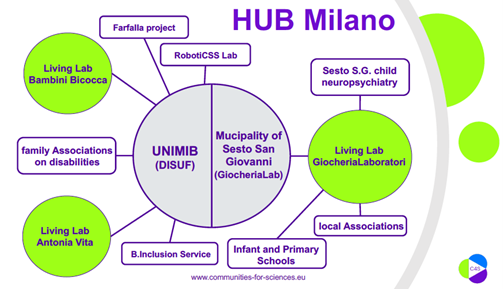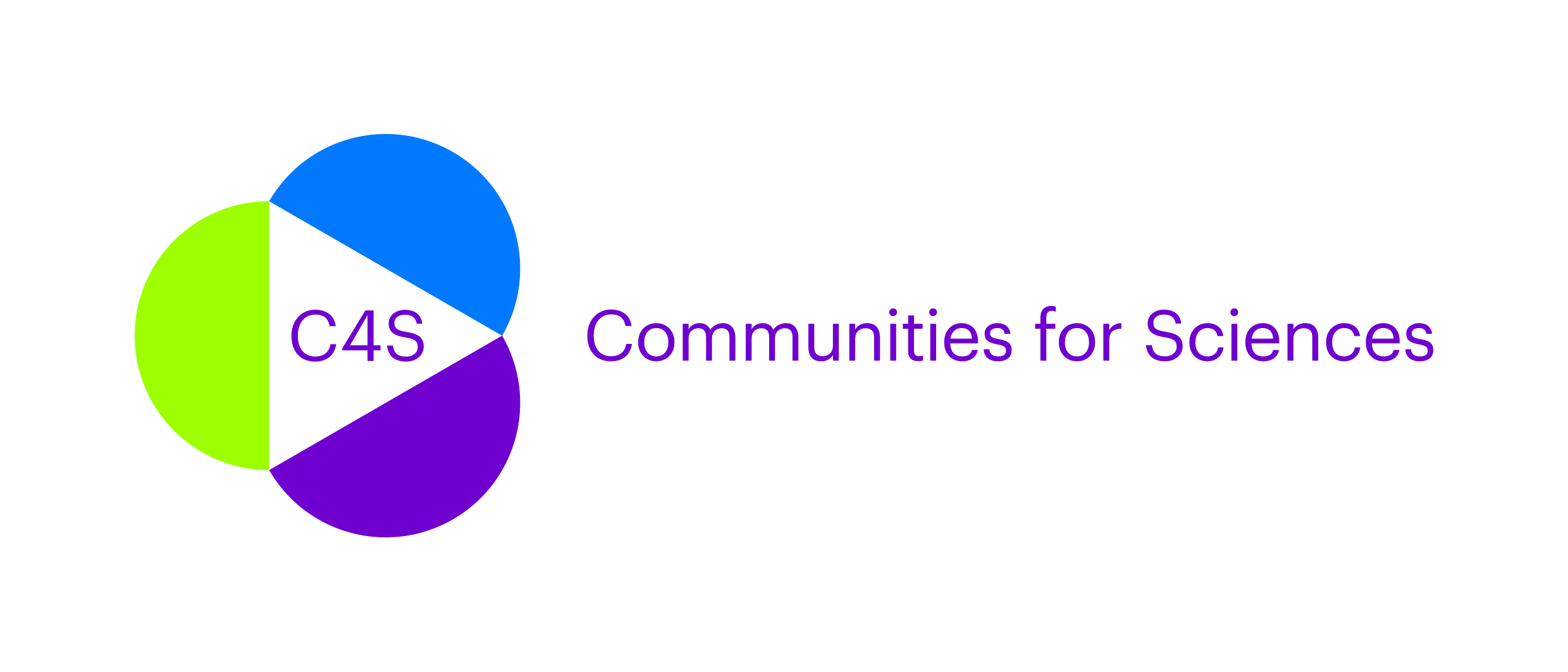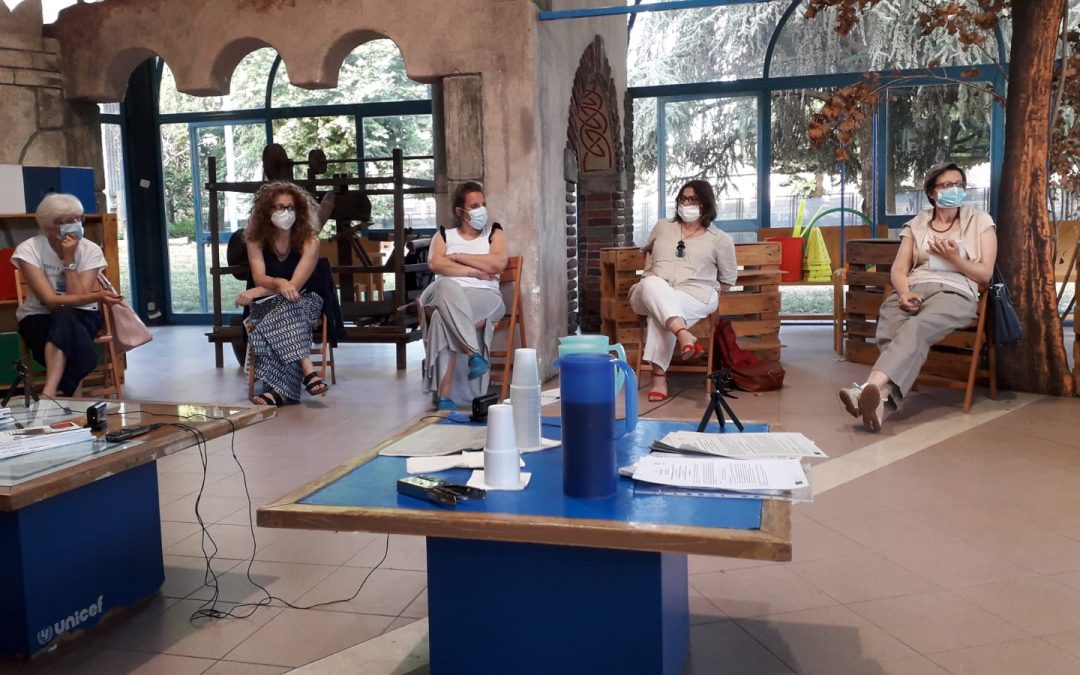To begin with, could you tell us a bit about your C4S team in Milan? Who you are, what your team members expect to provide, expertise, interests…
Our team consists of professors, researchers, pedagogists and educators with long experience in the field of ECEC, inclusive education, especially with children and adolescents with disabilities, special educational needs, or disadvantages of different natures and extent. The scientific coordination, as regards the University of Milano-Bicocca, is held by Luisa Zecca (who is the scientific head for the Hub), full professor in the field of Didactics and Educational design research, Roberta Garbo, researcher in the Inclusive Education field and delegate of the Rector for disability and specific learning disorders, and Valeria Cotza, assistant researcher and PhD student in Education; as regards the other Hub component, the Municipality of Sesto San Giovanni, this coordination is held by Alessandro Porcheddu, psycho-pedagogist and socio-educational specialist, and Simonetta Vimercati, educator, who both work in the service of GiocheriaLaboratori. The team expects to provide an extensive network of different skills, expertise and interests: for this reason, it also relies on a large number of collaborators and experts in the core areas of the C4S Project. The main expert collaborators, as regards the University of Milano-Bicocca, are Matteo Schianchi, researcher in pedagogy and special education, Monica Roncen, pedagogist expert in ECEC and Socio-Educational Services Management , and Edoardo Datteri, associate professor and philosopher of science. As regards Sesto San Giovanni, they are Laura Plebani, Alessandra Barbanti and Anna Cuccu, educators at the same service of GiocheriaLaboratori. Furthermore, the team also started a collaboration with Enrica Giordano, former professor of didactic of physics at the University of Milano-Bicocca, and Alessandra Bai, responsible for disability in school education of the Municipality of Sesto San Giovanni.
In one sentence, what do you think that the plurality and diversity of actors (from different backgrounds) participating in the project can provide to your settings and to the C4S project?
First of all, the plurality and diversity of actors involved will consolidate the circularity between research-training and public engagement. We imagine an impact on the network of services involved, especially in the way taking charge of students is finalised, also in order to develop prevention activities. Furthermore, we imagine that the project can have an impact on processes of integration of work between institutions, which we think has a direct implication on the life of communities. In addition, the training of educators, teachers and more generally practitioners should lead to an increase of competence in designing inclusive science environments and conducting workshops in this field.
How do you expect to implement the C4S project and activities in your territory? How do you expect to develop them considering your specific context/population/local needs?
Our team has embraced the perspective of the UN Convention on the Rights of Persons with Disabilities (2006) and the Universal Design for Learning, based on the ICF model. Our Hub is organised in working groups according to 3 directions: 1. networking; 2. teacher education; and 3. participative action-research. The first objective is to interview stakeholders in order to reconstruct both best practices and life stories; indeed, for this purpose, the UNIMIB team designed an interview outline. The second objective is to co-design and co-evaluate playground experiences and scientific laboratories, also by involving teachers and stakeholders in training paths, with the additional aim to develop multi-professional and multidisciplinary tables of professionals who look after children with disabilities. The third objective is to consolidate the network with the Directorate of the 0-6 Toddler and Infant School “Bambini Bicocca” Pole, which is provided with scientific ateliers for biological, ecological and environmental education within the nursery school and kindergarten. To develop these objectives, we are considering three levels of needs: 1. social cohesion needs of the territories (i.e. identifying the critical points in the system of services, work, schools, health, public administration and communication that do not allow children and adolescents and their families to be supported in a coherent way); 2. needs within organisations (i.e. being sure that organisations have material resources and competences to promote inclusive education); 3. needs of individuals (i.e. bringing together the assessments of individuals and families who care for children in conditions of vulnerability). People’s needs are outlined in individual portfolios, where specific indicators are defined on the basis of the ICF; instead, organisational needs are identified by the top management. The Hub team supports the processes of building specific development and learning objectives.
How do you think that an inclusive approach to science education can change societies? How do you think can make people more critical and empowered?
First of all, one of our specific objectives is to develop a research model that improves the competences of professionals involved in educational interventions, combining research and professional development and analysing teaching and learning practices and experiences, also to raise critical thinking and awareness on inclusive science education models in different environments. This model will allow the establishment of working groups and the co-design of pilot activities for a real equity and inclusion, through a workshop approach that allows collaborative small groups and peer-to-peer knowledge exchange. To make this, our team adopt a systemic and inclusive approach that cares about gross injustices and other sources of social disadvantages, through which to recognize the multi-problematic and multi-faceted nature of dimensions and situations; by assuming this perspective, people might be able to redesigning learning environments in their manifold aspects (physical, relational, social, and cultural), in order to grant accessibility, activities and participation. Within this framework, we will pay attention not only to severe disabilities, but also to learning difficulties and disadvantages, that lead to enormous inequalities in educational contexts.

Structure
Bambini Bicocca is a spin-off of UNIMIB, an innovative Toddler and Infant School. It is an experimental school, which promotes the active participation of parents and families and stimulate children to take part in sensory, cognitive (like in science) and expressive (like in music) experiences and activities. It experiments innovative approaches to the educational robotics and technologies for the inclusion and to the linguistic and musical learning. Moreover, it carries out research on multimedia tools for didactic planning and documentation.
The B.Inclusion Service, which is the Disability and DSA Service of UNIMIB, is addressed to freshmen and students with disabilities and specific learning disorders. The Service provides support for the university admissions tests and distributes different services, such as: accompanying within the university campus, coaching during the exams, equivalent tests, compensation tools, etc.
The Laboratory of Robotics for the Cognitive and Social Sciences (RobotiCSS Lab) of UNIMIB is a multidisciplinary research laboratory dedicated to analyse the roles that the robotic technologies play outside the robotics, with particular reference to educational robots as tools for the scientific research and to their social applications.
The “Antonia Vita” Association in Monza (Carrobiolo) offers multiple educational services, including a Popular School, to contrast the socio-cultural disadvantage among young people by tackling early school leaving. It provides educational work for adolescents and also support for families, networking with the schools and other educational and social services.
Farfalla Project is an open source application, which allows to personalize the reading and the navigation of the web pages (farfalla-project.org).
Living labs
Bambini Bicocca Scientific Atelier. Bambini Bicocca is an innovative Toddler and Infant School (3 months – 6 years), which experiments innovative teaching and learning approach through the Scientific Atelier (especially on biology and educational robot) and welcomes children with Charge syndrome and autism spectrum. The school is open Monday to Friday from 8 a.m. to 6 p.m.
www.youtube.com/watch?v=d_v7ZMrKwQ8&t=56s
GiocheriaLaboratori Kids Center. GiocheriaLaboratori is an educational service of the Municipality of Sesto San Giovanni, which designs and implements inclusive and non-formal scientific learning laboratories for and together with children aged 3-11 years.
sestosg.net/servizi/giocherialaboratori
“Antonia Vita” Popular School. “Antonia Vita” Association in Monza offers multiple educational services, including a Popular School to contrast discomfort and early school leaving of students aged 13-17 years, helping them to achieve the middle school diploma.
www.avitaonlus.org/scuola-popolare

